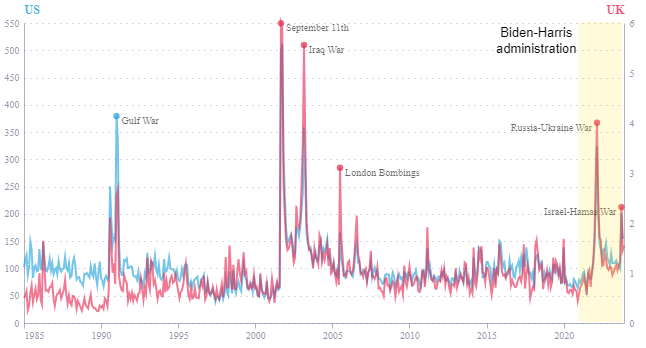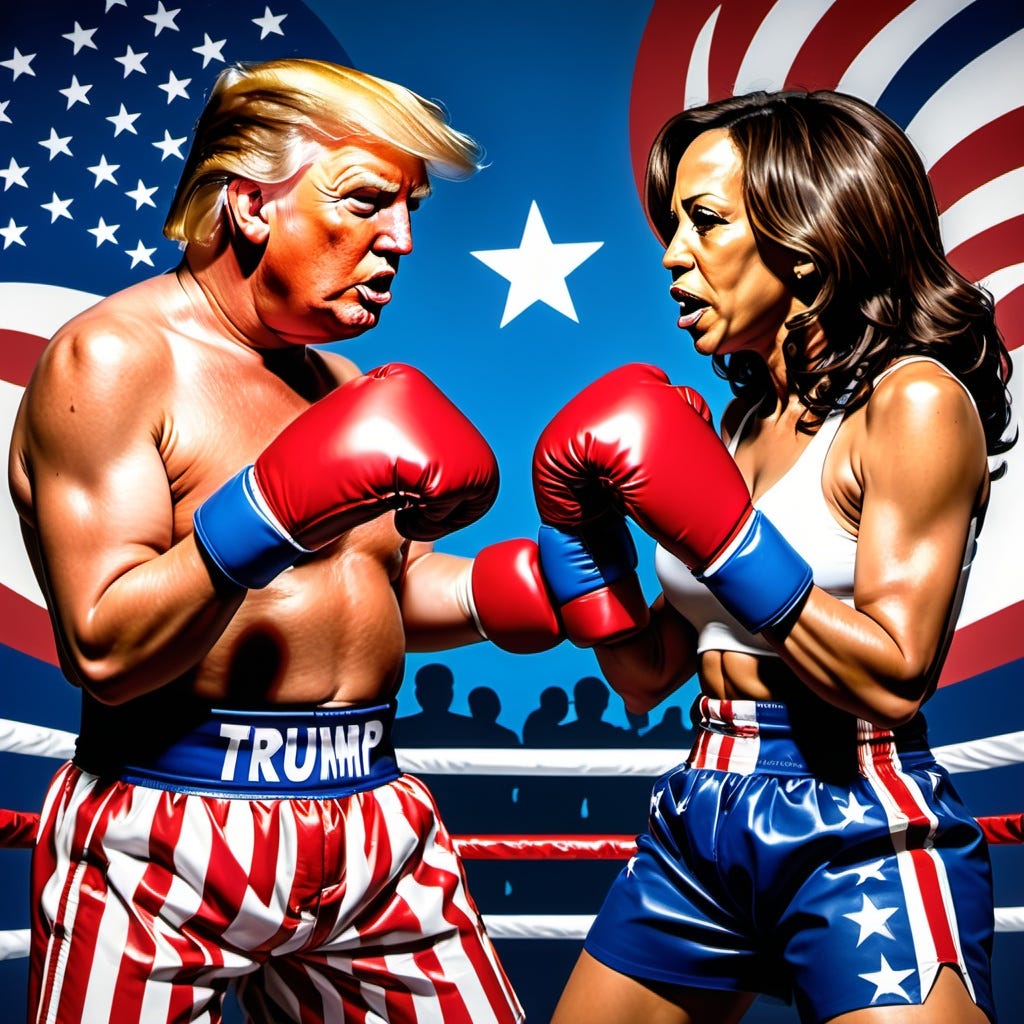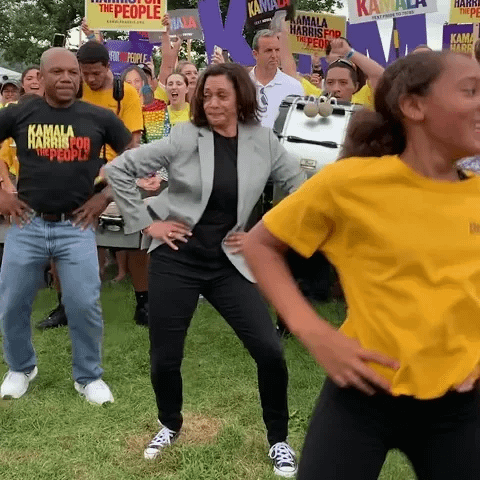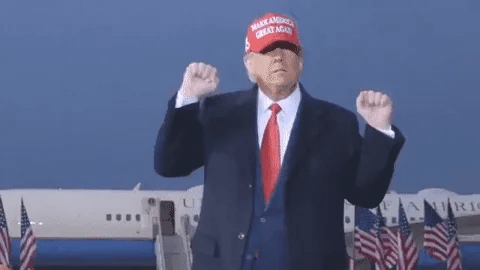The 2024 presidential bout
Warning: fiery but mostly fair & balanced opinions
Kamala Harris sits—if not factitiously, symbolically—atop the ticket of the go-along, get-along groupthink party. Donald Trump, a volatile cocktail of charlatanism, pugnaciousness, and dogmatism, leads the charge for the self-proclaimed party of dissidence. The former is flawed in her near-total alignment with her party's machinations, while the latter’s flaw is his complete lack of restraint. Anarchist or not, I find myself drawn to the candidate who resists institutional control rather than the one seemingly orchestrated by it.
The bout
Anthropological studies reveal a paradox: the more disdain we harbor for what’s unfolding before us, the more riveted we become as spectators. Like any other society, Americans love a good bout. Take, for instance, the recent 2024 World Series between the Dodgers and Yankees—two storied yet widely loathed franchises. Baseball fans across the country lamented the matchup, yet tuned in at record levels.
And let’s be honest—you’re tired of the political vitriol, sickened by both candidates, and yet, you’re watching more intently than ever. Understandably so; after all, how repulsive is this matchup? Let’s get some popcorn going.
🗣️🎙️
“VIBING IN THE LEFT CORNER WITH A “JOYOUS” CHIP ON HER—THAT’S RIGHT, HER—SHOULDER, WE HAVEEEE”
Kamala Harris—the political dilettante—ascending through a series of institutionally-facilitated advancements and wielding a varied set of strengths. These include, but aren’t limited to, virtue-signaling advocacy for social causes, persuasively appeal to the masses, political maneuverability, an adeptness at addressing key issues. And let’s not overlook her visible identifiers: her background and gender—assets not lost on a party focused on representation.
The Harris campaign also boasts a colossal fucking war chest, stocked by a not-so-short list of influential and institutional donors. After all, look at who they’re up against:
🗣️🎙️
“AND NOW, LADIES AND GENTLEMEN, STANDING IN THE RIGHT CORNER, DOWN BUT NEVER OUT, IT’S THE ONE AND ONLY, YOUR ANTI-WOKE CHAMPION OF THE WORLDDDD”
Former president Donald Trump, now seeking to avenge his defeat as an incumbent in 2020. Prior to his victory in 2016, he starred on a hit television show that revitalized his shaky business ventures and cemented the globally-recognized status of his brand. But following his 2020 defeat, he contested the outcome with some of his most fervent supporters going full-boar, McGregor vs bus window mode at the Capitol. And now, Trump presses forward on the campaign trail, all while dodging frequent assassination attempts—both on his character and his personal safety.
In all seriousness, what this election race has lacked in an “October surprise” has been more than offset by the childish theatrics and blatant obfuscation that have defined its every twist and turn. Regardless, by Wednesday (most likely), Americans will have a newly elected president whose policy agenda we must seriously accept, like it or not.
Why I can’t vote for Kamala Harris
As I laid out in my previous criticisms of Harris, it’s her faux-profundity and general lack of authenticity that I simply can’t get past. Even as her campaign has come to a head, it’s been conducted in the most egregiously superficial manner I’ve seen in my lifetime—on every front.
Beyond the few highly-coordinated, short-lived media appearances, the public has had little opportunity to see what’s truly beneath the surface. Who, really, is Kamala Harris, the human? What does she stand for?
These questions would be far easier to answer if Harris had been tested in a rigorous, contested race against a Republican opponent. In her 2016 Senate bid, she prevailed under conditions that were, in essence, uncontested—a race where the lack of a strong opposing party candidate meant she wasn’t truly battle-tested, as most candidates are in U.S. Senate races.
summed up the Harris campaign cogently:Harris has run a cautious campaign and largely avoided taking tough positions, with no glaring mistakes other than her deer-in-the-headlights answer on The View for what she would have done differently from Joe Biden.
Furthermore, consider her choice not to appear on the world’s most popular podcast, The Joe Rogan Experience, where both Trump and J.D. Vance have willingly faced unscripted conversations. Instead, her campaign reportedly stipulated that Rogan would need to travel to her, with the conversation capped at one hour—seemingly an attempt to shift the optics and make it appear as though Rogan declined to host her. Not the case:
Judging by this—not to mention the ever-sneering KamalaHQ Twitter X account—she appears less like a candidate and more like the curator of a Trump “burn book,” straight out of the film Mean Girls. And it’s glaringly apparent that her handlers—Democratic Party power players who effectively positioned her in place of Biden, and a media ever-willing to shape optics at the campaign’s behest—seem disinclined to present Kamala Harris, the person, to the public. To me, this signals something troubling: that the real Kamala Harris may not be suited to serve as president.
That said, I genuinely empathize with single-issue voters, especially young women in states where reproductive rights have been rolled back. But abortion appears to be the only issue on which Kamala has consistently held a firm position. So let’s talk about abortion.
Suppose I were voting solely on abortion rights. In 2020, I would have cast my vote for Biden, who ran on a pro-choice platform but ultimately couldn’t restore national abortion rights after Roe was overturned in 2022. What could Kamala do now that Biden hasn’t, especially given her role as vice president since 2021? Codify Roe v. Wade? This would require a Democratic majority in both houses and winning the presidency—an unlikely outcome in this election (Polymarket odds are currently at ~17%).
Realistically, Harris’s ability to make significant changes on abortion rights would face the same structural challenges that have constrained the current administration.
In fact, the only realistic path to codifying Roe v. Wade lies in eliminating the Senate filibuster for abortion-related legislation, a move that Kamala has publicly supported. But to me, this option is a slippery slope, setting a dangerous precedent that future Senate majorities could exploit to push through extreme measures with minimal opposition. I cannot support this. Absent Senate filibuster reform, a Harris presidency would amount to what we see in the current administration’s approach to abortion: public advocacy, with little practical impact.
Now, if I were to boil the casting of my vote down to one single issue, it would be the issue of foreign policy. Geopolitical risks have escalated considerably under the current administration, with Kamala Harris as vice president, yet she has offered no coherent plan to address these growing threats.

In that vein, I believe that a Harris administration introduces far more risk and uncertainty than a Trump administration. Former CIA analyst and author
framed it masterfully here:It is only a slight exaggeration to say that the policies and character of the president are the keys to war and peace in the world today.
How remarkable is it, then, that Kamala Harris was awarded the Democratic Party nomination, and may become the next president of the United States, while remaining a virtual blank slate on foreign affairs? In her four years as senator and four as vice president, Harris has managed to say nothing meaningful on the subject—a curious reticence, given that American politicians love to strut and lecture on the global stage.
I was willing to hear how Kamala Harris would separate herself from the current administration on foreign policy. These are the types of answers she’s given (note that this is an answer that 60 Minutes egregiously omitted):
It’s no surprise that her campaign has worked to keep her away from unscripted, substantive conversations; she often appears unprepared and stumbles when answering on the spot. Beyond abortion, the only “issue” she speaks on with conviction isn’t really an issue at all—it’s simply criticizing her opponent.
When asked about Trump’s “enemy within” rhetoric, she insists that you should take Trump at his word. But when asked to clarify her rhetoric around Project 2025 in response to the Trump campaign’s claims of having no association with it, she insists that Trump is obfuscating, and that he shouldn’t be taken at his word. So which is it?
This kind of shape-shifting commentary seems indicative of what we could expect from a Harris presidency, even at the policy level. Her campaign’s contradictory moves, like running anti-Israel ads in Michigan to court Muslim voters while simultaneously running anti-Hamas ads in Pennsylvania to attract Jewish voters, underscore this inconsistency.
And beyond the standard Democratic talking points we hear every election cycle—affordable healthcare, lower prescription drug costs, making the wealthy “pay their fair share,” creating a middle-class-friendly economy, and more, none of which have fully materialized—Kamala Harris remains a wild card, a political chameleon.
Put differently, Kamala Harris is an “unknown unknown.” Remember Donald Rumsfeld’s musings on the interplay between knowns and unknowns? For all his faults (he was a bad guy), Rumsfeld was right about the existential risks that lie in the realm of “unknown unknowns.”
Reports that say that something hasn't happened are always interesting to me, because as we know, there are known knowns; there are things we know we know. We also know there are known unknowns; that is to say we know there are some things we do not know. But there are also unknown unknowns—the ones we don't know we don't know. And if one looks throughout the history of our country and other free countries, it is the latter category that tends to be the difficult ones.
This difficulty—or inherent risk—looms large with the prospect of a Harris presidency. Not only are her core values, ideals, and beliefs largely undefined, but her positions on critical policy issues remain equally opaque. This vagueness is especially evident as her campaign has scrambled to distance itself from the current administration’s policy failures following her October 8 misstep on ABC’s The View:
There is not a thing that comes to mind in terms of – and I’ve been a part of most of the decisions that have had impact, the work that we have done.
Asked what she’d do differently during an ensuing interview with Fox’s Bret Bair on October 17, more opaqueness:
Let me be very clear, my presidency will not be a continuation of Joe Biden’s presidency, and like every new president that comes in to office, I will bring my life experiences, my professional experiences and fresh and new ideas.
Indeed, Kamala Harris is truly the “unknown unknown” of this election.
To the non-single-issue voters, her frequent shifts in policy stances coupled by her utter lack of conviction on key policy issues creates a unique situation where both her potential actions and her underlying motivations remain ambiguous. This uncertainty is compounded by the fact that, without a clear ideological foundation or consistent values to anchor her choices, it becomes exceptionally difficult to anticipate how she might respond to unexpected crises or major policy decisions.
Many Americans share this sentiment. For the cadre of alarmists on the left, actively amplified by institutions like the mainstream media, the ideal scenario is one in which voters cast their ballots out of overwhelming fear of a Trump presidency rather than from confidence in Kamala’s vision or proposals.
“They” (and I use that term reluctantly, though it applies here) would have voters believe that a Trump victory would lead the U.S. down a path toward authoritarian chaos, with “lawfare” running rampant and Trump weaponizing the Justice Department against his political opponents.
But isn’t that precisely what he would have done to Hillary Clinton during his first term in office? Recall the “Lock her up!” chants during Trump’s 2016 campaign. The last you heard of such rhetoric was… during his 2016 campaign because Trump spent no time or energy during his presidency on such matters.
When asked about why he didn’t follow up on this, Trump’s reasoning is that it would have made it more difficult for him to work with congressional Democrats.
Conversely, the left waged a relentless political and legal war on Trump throughout his presidency, advancing what amounted to a disinformation campaign—a hoax. Every policy move he pursued was portrayed by Democrats and the media as gravely dangerous.
Even after he left office, another lawfare campaign was launched from 2022 on, this time via liberal prosecutors and Biden-appointed judges. All so that during the campaign, the left could dismiss their political opponent as a criminal. Whether or not that is a legitimate claim is irrelevant; the American public has called bullshit.
When confronted with criticism that the left is “crying wolf” again, especially given that Trump’s first term proved relatively benign despite the constant alarm, the anti-Trump camp often counters with a familiar refrain: eventually, the wolf showed up in The Boy Who Cried Wolf. This time, they argue, Trump’s fascism will finally come to fruition.
But the reality is that in today’s political climate, the go-to strategy is to accuse your opponent of precisely the sins your party commits. What’s more fascist? Trump’s questionable comments or the coordinated lawfare campaigns perpetuated by Democrats and carried out by judges whom they appointed?
Granted, alarmist rhetoric is a valid response to a perceived looming danger. And if Trump is such a looming danger, then a political counterrevolution is warranted. But if the Democrats wish for a revolutionary response, they ought to roll out an arsenal of compelling candidates and let the people of their party legitimately decide which one is best.
Those calling for a revolt had their guy in 2016: Bernie Sanders, revolutionary in his own right (and by the way, the most authentic politician of his generation). But his movement was stymied in favor of the DNC’s established candidate, Hillary Clinton.1
The Democratic Party—the ones subverting the electoral process while labeling the opposition a “threat to democracy”—ought to sow faith in democracy by adhering to established processes (such as primaries which, in 2019, provided for the swift elimination of Kamala Harris). Seizure of power through circumvention is instead what they’ve chosen. And most Americans, by now, see that for what it is: the Democrats’ desperate need for control. Did somebody say “Big Brother”?
Simply put, I object to both the tactics being used by the Democrats and the candidate whom they chose to install.2
Why I can (and will) vote for Donald Trump
This will be my fourth general election as a voting adult. I’ve never voted for Donald Trump, so tomorrow will be my first time doing so.
Each election cycle seems increasingly filled with alarmist rhetoric. Then, the election happens, power transitions, and life continues. Trump’s first term, both domestically and internationally, could be characterized as, at worst, benign. Inflation remained in check, unemployment steadily dropped, there was relative peace abroad, and immigration was far from the crisis it is today. At best, it was a time of prosperity. I recall my disposable income increasing by nearly 15% due to the Tax Cuts and Jobs Act3—a significant boost at the time (I was making less than six figures).
Kamala Harris remains an uncertain variable, whereas Donald Trump is a known quantity. We know who he is (unfiltered and at times reprehensible), and we know his approach to major national issues. On key issues—foreign policy, immigration, and the national debt—Trump presents an obvious choice:
Foreign Policy: He’s demonstrated his ability to broker peace in the Middle East, as seen with the Abraham Accords.
Fiscal Policy: He’s consistently advocated for rigorous cost-cutting measures to reduce government excess. Call it austerity or whatever you prefer, but reducing the federal budget deficit is essential if we are ever to tackle the national debt.
Immigration: Securing the southern border has been a top priority for him. He made headway on this issue before, and with the problem worsening after his departure from office, I believe his next administration would be poised to address it again effectively.
Furthermore, I believe that within a Trump administration, RFK Jr. (who had my support before he left the race) would be an effective catalyst for addressing the chronic disease crisis in America—one rooted in permissive laws regarding the chemicals used by the agriculture and food industries. Additionally, RFK Jr. is a strong advocate for climate action which remains a pressing global issue.
And to be clear, I’m not here to defend Donald Trump’s language or behavior. Some of his rhetoric has undoubtedly crossed the line, raising valid concerns. I’ve already published part one of a two-part analysis on whether Trump falls into the category of “fascist,” with part two coming soon.
For now, here’s my take: the U.S. Constitution and legal system—through its separation of powers, federalism, First Amendment protections, and restrictions on executive authority—are specifically designed to prevent the transformation of America into a fascist state, even if a president with authoritarian tendencies takes office.
If Trump’s populism alone is the concern, it’s time to move past that. The MAGA movement arose from real frustration: disillusionment with the unfulfilled promises of a perceived political establishment and the anger of working-class Americans who felt neglected by the economic and social shifts of globalism.
For those seeking to hold someone accountable for perceived fascism in America, I’d argue there’s more to examine within the DNC’s subversion of the 2016 primary process than in Trump’s populism. (Bernie Sanders is, too, populist, but instead, a socialist.)
Trump has always been a populist—no more, no less. That’s a known known. If his rhetoric is the primary argument for voting for Kamala Harris, respectfully, I’ll pass. I believe our system is strong enough to withstand and contain a fascist movement, should one emerge, so I’ll take the potential good of a Trump presidency along with the bad.
Whether it’s Trump or Kamala who ultimately gets the nod, I firmly believe the country will be just fine (though I’d prefer the former to the latter).
Through the use of the superdelegate system, which has since been reformed.
Additionally, Google is the top donor to the Harris campaign. There is much to say regarding Google’s manipulative practices in leveraging ephemeral data (search suggestions, search results) to nudge along public perceptions, practices which I find grotesque. I hope to cover this topic sooner than later.
Which is set to expire in 2025 meaning that unless the next administration passes new legislation (or through executive order), taxes will go back up for both corporations and the middle class.







Great analysis! Kamala is a snake in the grass.
Excellent breakdown of the major truths that should be obvious to everyone this election cycle!